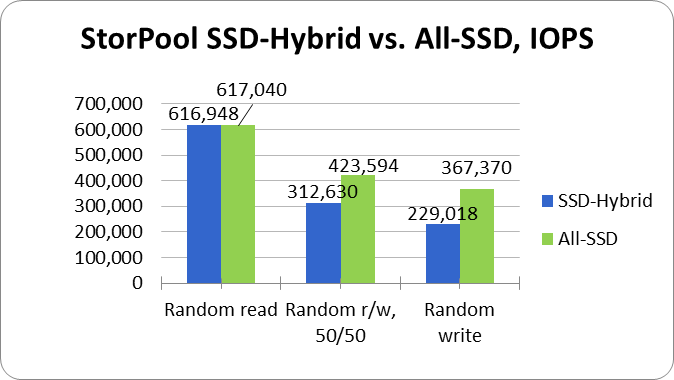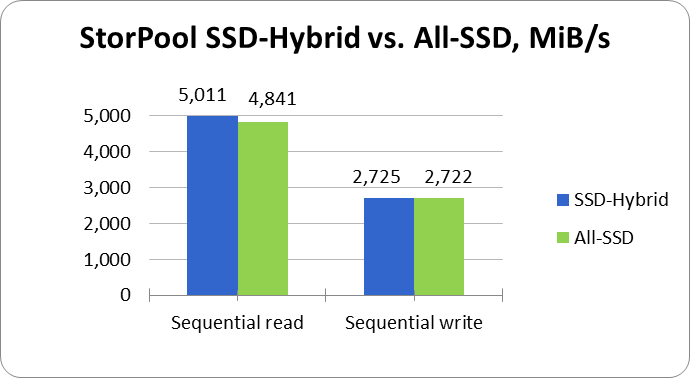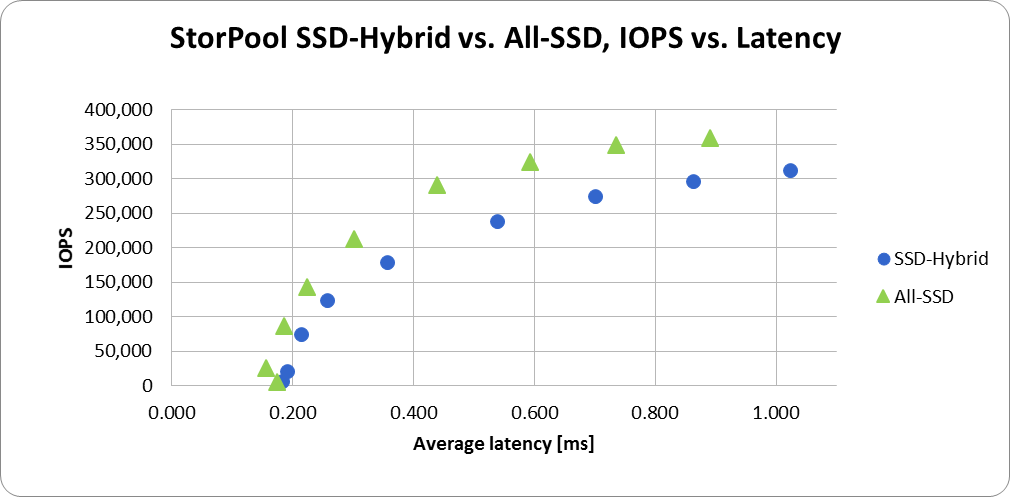What are the differences between hybrid storage solutions “SSD-Hybrid” vs. “All-SSD”? Minor in terms of performance.
StorPool has a unique way of building hybrid storage solutions. It is called StorPool “SSD-Hybrid”, which keeps 1 copy of data on SSD and 2 redundant copies of data on HDDs. I.e. for each 1 TB raw on SSD we the StorPool SSD-Hybrid uses exactly 2 TB raw on HDD. All reads/writes come/go to the SSDs and are also saved on a Write-Back Cache (WBC) and then flushed to the HDDs. The end result is achieving all-flash level of performance (IOPS, MB/s) and also all-flash latency. However we achieve this at a much lower total solution cost, as most data resides on cheap HDDs.
A question we often get is how do these 2 software-defined storage technologies differ in terms of performance and price. This post answers these questions.
The data here is aggregated from a couple of performance test we have carried. You can find the full tests of each scenario here:
1. Performance Test: StorPool “SSD-Hybrid” shared storage system with 20x SSDs and 40x HDDs
2. Performance Test: StorPool “All-SSD” shared storage system with 20x SSDs
So here is how a StorPool “SSD-Hybrid” system differs from an “All-SSD” one
As visible from this table the 2 systems deliver extremely good performance and low latency. Both peak at over 500,000 IOPS. The major difference is when it comes to random write: the All-SSD is 60% faster in this case, although the SSD-Hybrid system delivers more than enough performance (229k IOPS) for the vast majority of use cases.
The 2 systems are on-par in terms of throughput, with basically identical results:
Latency:
As expected the All-SSD system is a bit better in terms of latency, although by a small margin. However it peaks to nearly 360k IOPS at 1 ms:
The systems are pretty much on-par again, with very little differences. Here are the complete results:
Summary:
Both the StorPool hybrid storage solutions “SSD-Hybrid” and the “All-SSD” systems deliver outstanding performance and price/performance metrics. The 3 main differences from these systems are:
1. An SSD-Hybrid system uses 3x replication, compared to 2x replication in the All-SSD system. 3x is more reliable, although All-Flash system with 2 copies rebuilds faster and thus has adequate protection to your data (it is considerably more reliable than a RAID 10 system for example). Also customers can choose to run a triple replicated all-SSD system, which will increase the cost of the SSD media, but not the cost of the StorPool license & support, as you would expect from a proper software-defined storage system;
2. The All-SSD system delivers 2 times higher IOPS/GB density: 17.7 IOPS/GB (SSD-Hybrid) vs. 35.4 IOPS/GB (All-SSD);
3. The 2 systems handle hardware failure differently. If in the SSD-Hybrid you lose a storage node, you will lose a portion of the SSDs and thus some operations will go to HDDs. This will reduce IOPS and increase latency for some operations, although the impact is usually not drastic. For example in the example above (5 nodes with 4xSSDs and 8x HDD each): If you lose 1 node, then 20% of the read/write operations will come/go to HDDs. If in an All-SSD system you lose a node, you will see lower impact, since the second copy of data is on SSD again.
Do not hesitate to contact us if you have any questions: info@storpool.slm.dev.





